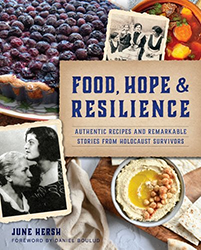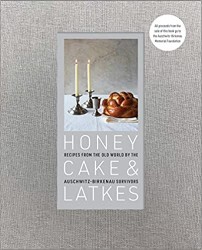Recipes Remembered is far more than a cookbook. The photograph on the cover — a Star of David cutting into cookie dough — immediately brings to mind the painful symbol of the yellow Jewish star worn by those caught in the Holocaust. Here are the remarkable stories of Holocaust survivors, along with their authentic recipes. June Feiss Hersh, a retired teacher, passionate cook, culinary columnist, blogger, and food archivist, writes that the book reflects her passion for wanting to remember, preserve, and pass on a world gone by. Hersh is “forever humbled and honored to share” this world. The recipes were tested and retested, for she fully understands that many of the cooks prepared these foods from memory and instinct. She admits that there were recipes that the survivors could not recreate, and she wisely called upon professionals, many of them famous, to complement the recollections. The professional contributors add their “take” on those forgotten scents and savors, thus rounding out the memories.
Chapters are arranged by country of origin: Poland, Austria and Germany, Belgium and France, Hungary and Czechoslovakia, Romania, Russia and the Ukraine. There are also Mediterranean dishes, some with a profound Greek influence. All are poignant reminders of the arenas so connected to that tragic point of our history. It is important to bring the recipes into your kitchen, to be reminded of our historical past.
Jolie Feldman is the granddaughter of Ada Ehrlich Rubin and Leo Rubin. As she shares their story we learn that the recipe for “Ada Ehrlich’s Chocolate Chip Cake” was “interpreted from handwritten notes that Ada wrote in her later years.” Ada was a survivor of Auschwitz.
The section titled “Artifacts,” with photos mostly from the collection of the Museum of Jewish Heritage — A Living Memorial to the Holocaust, includes a bowl from Germany used to hold salt water at the Passover seder, a wooden spoon from Bergen-Belsen, a large spoon from Auschwitz, a recipe book for salted herring from Germany, and other extraordinary objects.
Reni Hanau’s “Waffeln-Waffles” enhance our enjoyment through her memory of her mom’s cooking, which traveled with her from Germany to England and on to America. The recipe can also be made as pancakes. Reni’s father was a teacher and the shochet (butcher) in his small town in Germany. Sharing her memories, Reni declares, is “like bringing a part of their old life into their new life.”
There is a section which helps the reader-cook delve into baking instructions and utensils, ingredients, and equipment for the kitchen, as well as a glossary and index. Use this book well, get to know the survivors through their words, and learn to bless each day.





